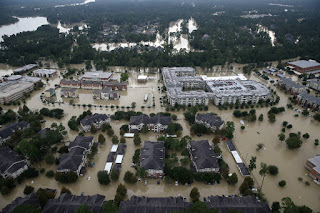The third-warmest year on record in the contiguous United States racked up $306 billion in disaster losses, setting an unwanted record for 2017.
Hurricane Harvey's extreme rainfall and the most devastating wildfire season on record contributed to $306 billion in damages from climate and weather disasters in the United States in 2017, shattering the previous record by more than $90 billion, according to a federal report released Monday.
The National Oceanic and Atmospheric Administration's recap of the nation's climate over the past year found that 2017 was the third-warmest on record. What's more, it was warmer than average in every state across the lower 48 and Alaska for the third consecutive year. (Hawaii is excluded because of a lack of historical data and other factors.)
"That's pretty unusual," said Jake Crouch, a climate scientist at NOAA and the lead author of the report. Such a stretch hasn't occurred in many decades, he said, and is a sign of the degree to which the climate is warming. "The contiguous United States is a pretty big place, and there are features of the climate system that usually make some places colder."
While 2017 was not the hottest year, each of the five warmest years since record-keeping began in 1895 have come since 2006. The average annual temperature in the contiguous U.S. last year was 2.6 degrees Fahrenheit above the 20th Century average, and five states registered their warmest years on record: Arizona, Georgia, New Mexico, North Carolina, and South Carolina.
A Year of Billion-Dollar Disasters
But when it comes to damage, 2017 stood apart.
Until this year the costliest year on record was 2005, when Hurricane Katrina and two other major storms contributed to $215 billion in losses. Last year, 16 weather disasters inflicted $1 billion or more in losses, which include any costs incurred as a result of a disaster, tying 2011. NOAA counts all the wildfires across California and the West as one event, and in 2017 they cost the nation $18 billion, three times more than any previous fire season.
Congress has approved more than $50 billion in disaster aid since summer, and the U.S. House in December passed a bill that would provide an additional $81 billion.
Connecting Extreme Weather to Climate Change
While it's too early to say exactly what role a warming climate played in many of those disasters, a handful of studies have begun to shed some light. Some research has found that warming temperatures and changing precipitation patterns may be making parts of California more vulnerable to wildfires, for example. Two studies published in December found that climate change had made Harvey's rainfall more intense—by as much as 38 percent.
At a town hall event at the annual meeting of the American Meteorological Society on Monday, Kerry Emanuel, a professor of atmospheric science at the Massachusetts Institute of Technology, spoke about the influence of climate changes on tropical cyclones.
"We've been saying for decades now that there are two things that are a pretty sure bet," he said. "The incidence of high intensity events are going to go up in general, and rainfall from a given hurricane is going to go up a lot."
A large body of research has suggested that as the climate warms, we'll also see more weather extremes, from heavier rainfall to more intense drought and heat. NOAA has an index that measures such extremes, and its value was the second highest last year.
Read more at Hurricanes, Fires Shatter U.S. Record for Disaster Costs as the Planet Warms


No comments:
Post a Comment